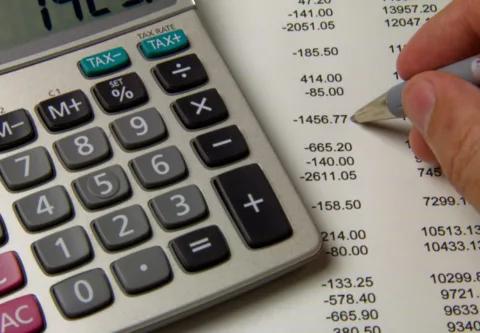Maneuvering freelance taxes is something I’ve taken an interest in finding out more about only by pure necessity.
While I’ve been paying taxes on my freelance writing assignments for years, the 2015 tax year marked the first time that virtually all of my income was derived from freelance writing.
It’s exciting to be earning money as an independent contractor, but I’ll admit it’s a little nervewracking knowing what I should and shouldn’t do when it comes to filing taxes — especially during that first year on my own.
Thankfully, I did a lot of things right — such as saving about 30% of all my earnings and putting that money in a savings account to pay for my taxes.
I also saved receipts for:
- Incidental business purchases
- Office equipment
- Minor office supplies used for business-related matters
- Meals with business clients
- Gas used for interviews
- Other small business expenses which, of course, do add up
Beyond saving receipts, there are several other things I’ve found out about freelance taxes in this first full year of complete self employment.
While I’m a professional writer, I’m not a financial professional. Therefore everything I discuss in this post should be taken only as general information that I’ve picked up from personal experience.
With that being said, here are 5 of the most important lessons I’ve learned about freelance taxes…
#1 – Save At Least 30% Of All Income In A Tax Savings Account
It’s alluring to cash every last cent from your freelance writing checks and spend it all on a trip — or pay the rent. But some of that money belongs to Uncle Sam.
That’s why I put away at least 30% of all my freelance writing payments — checks, PayPal transactions, or otherwise — into a special savings account. It’s really just a regular, interest-bearing savings account, but I’ve designated it as a tax account.
30% of the money I take off the top of every freelance writing payment I earn, and I put those funds into that specific savings account.
I may not necessarily need to spend every last cent in that account for that year’s tax payment, but it’s better to be safe than sorry.
While you’re saving money, you might as well put another 10% into your other savings accounts for emergency funds, vacations, gifts, etc.
When all is said and done, only a little more than 50% of my earnings actually end up as cash in my hands or are deposited into my checking account.
Perhaps a similar savings plan may work for you.
#2 – The Minimum You Need To Earn To Pay Freelance Tax Is $400
Freelance taxes generally work differently than taxes for those who work W2 jobs.
In fact, if you earn all your wages as a freelancer, income is reported on a 1099 form, and you don’t have any taxes withheld, you’ll have to report as soon as you gross just $400 during in a year. That’s right — $400.
Let’s say you gross $1,000 in a year, have $700 in legitimate deductions, and net $300. You won’t owe any income taxes, but you will still need to file — with all deductions listed.
Meanwhile, if you gross that same $1,000 and have, say, $500 in deductions, you’ll still have to file and you will owe taxes on your net $500 income. Make sense?
Those who call themselves freelancers but have their wages reported on W2s generally still play by the W2 rules.
It’s best to confirm your specific requirements with a tax advisor — in case there are other considerations that you’ll need to take into account.
#3 – What About Those Health Insurance Penalties Everyone Talks About?
You may be aware that recent changes to insurance laws mean you must have health insurance or else you could be fined hundreds of dollars or more.
How does this work?
The new insurance laws essentially require people to pay into the healthcare system one way or another. The choices are quite simple — you either do this by buying insurance or through paying penalties.
For most people, the choice is pretty obvious: buy health insurance, instead of spending all of that money toward some fine.
Still, there are those who either don’t want to buy insurance, or for whom paying the fine is less expensive than buying health care coverage.
There are many insurance plans available through the Healthcare Marketplace — widely referred to as Obamacare.
Or, you can pay the penalties for not having health insurance. Here’s how it breaks down right now:
You pay either a percentage of your household income or per person, whichever amount is higher.
So…
- 2.5% of household income
- Total yearly premium for the national average price of a Bronze healthcare insurance plan sold through the Healthcare Marketplace
Per-person insurance penalties presently run $695 per adult, $347.50 per child under 18 years of age, or a maximum of $2,085.
If the per-person penalty is employed, it applies only to the people in the household who don’t have coverage — not everybody in the home.
Don’t worry, if you’re without health insurance for just 1 or 2 months, you should be OK under the “short gap” exemption.
What do you do if you’re hit with a fee?
First off, don’t panic. But don’t try avoiding the issue, and do seek professional tax counsel through a certified public accountant (CPA) or other skilled financial advisor.
With the proper help, you may be able to successfully appeal the fine or mitigate the penalty.
#4 – You Can Make Many Legitimate Deductions, But Be Careful
If you have qualifying tax deductions, then great — you’ll avoid paying taxes on your entire gross income.
There are plenty of ways you can take deductions on your freelance taxes, such as:
- Making donations to charitable causes
- Spending money on legitimate business expenses
- Buying certain energy-efficient products
- Paying for a certain medical expenses
- Paying state sales tax
- Incurring job hunting expenses
- And much more, as applicable in your state and tax year
Whatever you do, don’t get too overzealous on taking tax deductions.
For example, don’t overinflate the declared values on items that you donate to charitable organizations. Be especially careful when assigning values to major items like boats, cars, and the like — which are usually looked at very carefully by the IRS.
Here are some tax deduction links that I’ve found helpful:
https://www.youtube.com/watch?v=28t_ns2EmUY
#5 – Be Careful Using Online Tax Services For Filing Freelance Taxes
I’m not opposed to using online tax filing services — I’ve used them myself many times and have had no problems so far at all.
But during my first year as a full-time freelance writer, I decided to spend the extra money to hire a CPA to assist me.
He provided me with a wealth of information, including:
- Tips on what I should and shouldn’t deduct as a business owner
- Which documents to save and which ones I should just shred
- Ideas for how to save more money in the future
Many online tax filing services are very good and extremely convenient — especially for those whose main source of income is reported on W2 tax forms.
But, I was a little concerned about missing a deduction or, worse yet, raising a red flag with the IRS because I accidentally misrepresented something on my return.
If you’re pretty confident in your ability to properly input every last deduction, account for every last cent earned by cash payment, PayPal, or other sources, and are pretty sure you can maneuver the ins and outs of tax law in your state — then great! By all means file your freelance taxes online.
But if you want to make sure that you’ve crossed each T, dotted every I, and minded all of your Ps and Qs, then consider filing your freelance taxes with a CPA.







